Aachen
Apart from its medieval significance and a wealth of preserved artifacts, Aachen is also known for its springs, which have been attracting visitors since the Ancient Roman times and continue to do so today, with a number of historic baths and hotels sprinkled around the city. Contributing to the city's wealth and prominence is also the technical university, which made Aachen a hub for modern technologies and provides a sizeable student population (over 40,000 of the total 250,000 inhabitants). With all this, Aachen is now a multi-cultural, popular tourist destination.
Historically this spa-town was a prominent city, the place where the German Kings were crowned, and a famously favoured residence of Charlemagne who still lies buried in the impressive cathedral he himself had built. The city is packed with historic sights that remind of those days, including medieval buildings, city gates and beautiful fountains.
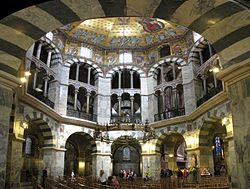
Understand
As Aachen is a legally recognised spa, it could call itself Bad Aachen, but refuses to do so, as it then would no longer be first in almost all alphabetical lists.
The city lies at the borders of Germany with Belgium and the Netherlands, forming the economic region called the Euregio. There are several Euregios in Europe, but regionally speaking just of "the Euregio" is understood to mean the one centred on Aachen.
Get in
By plane
Aachen shares its own airport with Maastricht, but Maastricht-Aachen airport (MST) (located some 40 km outside the city centre, in the Netherlands) is connected to only a limited number of international destinations and served by budget carriers. An Airport Express shuttle runs regularly to and from Aachen main bus station, called Gilbacher AirportXpress and leaves from platform 4. Tickets can only be purchased from the driver and cost . There are no trains between Aachen and the airport.The nearest large airports are Düsseldorf (DUS) and Cologne-Bonn (CGN). Both airports can be reached by train, via the Düsseldorf and Cologne central stations respectively. Other small airports within reasonable distance are Weeze (NRN, trains) and "Brussels" South Charleroi Airport (CRL, trains). Also Liège (Lüttich) airport in Belgium is around 45min car journey away. Antwerp airport, also in Belgium, requires a 90-minute car ride. Finally, Eindhoven airport in the Netherlands is at 1 hour car ride distance. Probably Aachen is unique in having 8 airports in 3 countries within 140 km.
If for some reason none of the nearby airports are feasible or affordable, the airport in Frankfurt (FRA), Germany's main hub, has a direct ICE connection and offers a number of trains to Aachen with one interchange or less.
For some airports the rail&fly programme the German railways offer together with several airlines might be an option. For more on that see rail air alliances
By train
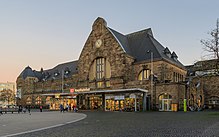
From France and Belgium
Both Thalys and ICE-Trains connect with Liège and Brussels with Thalys trains continuing to Paris. There are also local trains from Liège every two hours.From elsewhere in Germany
Local trains (Regionalexpress) from Cologne and Düsseldorf run every half hour and take around 55 minutes from Cologne, 85 to 110 minutes from Düsseldorf. Ten times per day, high speed trains go from Cologne to Brussels via Aachen (around 35 minutes), either Inter City Express (coming from Frankfurt) or Thalys (continuing to Paris).By bus
eurolines travel to and from Aachen. There are direct journeys to London (approximately 10 hours), Brussels (3 hours), Paris (6.5 hours) and Prague (11.5 hours), among others. Coaches depart from Wilmersdorfer Straße, on the outskirts of the city. The selection of domestic routes is surprisingly less extensive, although Aachen is not far from Cologne, which is served by many more routes.
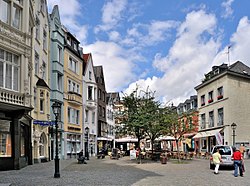
By car
Being on major routes from the Netherlands and Belgium to Germany, easily reachable via the A4 and A44.Parking in the town centre costs around per hour. There is also park and ride available around the outskirts of the town.
If you don't have your own vehicle, car-sharing is a possibility. Car-sharing is very common in Germany, but you should of course be cautious when booking a trip nonetheless. blablacar.de and mitfahrgelegenheit.de are good resources for finding rides to Aachen, although you're less likely to be successful if you're looking to book far in advance. Payment is expected.
From the Netherlands
- Bus line 50 from Maastricht serves Aachen every 15 minutes and passes through Margraten and Vaals. Bus line 44 runs between Heerlen and Aachen (45 min, ) For you can buy a ticket, which allows all-day travel on South Limburg bus routes, including those to local cities such as Heerlen, and selected train routes. It is 1 hr 15 min from Maastricht. See Veolia Transport for timetables (Regio: Limburg).
- From Heerlen there's also a direct train connection.
- By car, you can just drive in via Vaals or take the highway. The A76 connects to the German A4. Take exit 2 to Aachen/Laurensberg.
Get around
-
ASEAG Customer-Centre
address: Schumacherstraße 14, 52062On arrival in Aachen, it may be worth visiting the ASEAG Customer-Centre (ASEAG operate the city's bus system) opposite the bus station. Here, you can pick up timetables for all bus routes run by the company and you can of course speak to an adviser as well. There are no timetables available for services run by Veolia, such as the number 50 to Maastricht, or for bus services run by Deutsche Bahn, such as the number 66 to Monschau. - By train: Whilst Aachen does not have an U-Bahn or S-Bahn network like many other large German cities, it is still possible to travel through the city by train. The euregio-Bahn is a local line that stops at the stations Aachen West (not far from RWTH Aachen University), Aachen-Schanz, Aachen Hauptbahnhof (the most convenient for the city centre) and Aachen-Rothe Erde. A single ticket for a journey within the city is ; ticket machines are available at all stations.
The old town is best explored on foot and orientation signs can be found all around. Aachen at a whole is a fairly large city. A car can come in handy but parking can get expensive, especially in the center of town.
Fortunately, Aachen has an excellent city bus system, operated by ASEAG, including a few night bus lines. You can get tickets from the bus driver. You can rent a bike at the "fahrrad station", in the central train station. Although it is not the most biker-friendly town in Germany, there are a number of bike routes and getting around on bike is increasingly popular. Taxis are readily available on the train stations but also on streets.
See
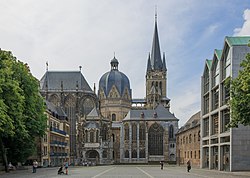
-
phone: +49 241 4770 90address: Domhof 1Aachen Cathedral is one of the most famous examples of occidental architecture. Around 800, the core building of the Palace Chapel was built. During the 14th and 15th centuries, the Gothic choir (the "Aachen glasshouse"), the north and south chapel were added. Through the centuries, many other constructions and decorations were completed. Today, it is a unique and beautiful two-storey cathedral of classical pillars, bronze railings, golden masterpieces, glassworks, etc. The cathedral is the memorial and funeral place of Charlemagne (814). Heiligtumsfahrt The Aachen pilgrimage has taken place every year since 1349. In 1978 it was the first German building to be inscribed as a UNESCO World Heritage Site.
-
Aachen Cathedral Tour
address: Dominformation Visitor Center, Johannes-Paul-II.-StrThere's a 45 min English guided tour every day. Tickets are sold inside Dominformation (not the cathedral).
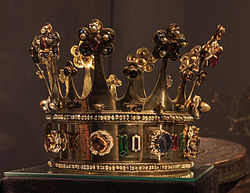
-
address: Johannes-Paul-II.-StraßeEcclesiastical treasures from Antique, Carolingian, Ottonian and Staufian epochs,including Cross of Lothair and the Bust of Charlemagne. Public and private tours are available with reservations for additional cost.
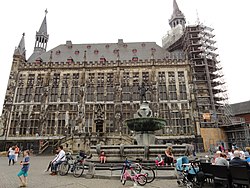
-
phone: +49 241 4320address: MarktThe medieval town hall. The mayor of Aachen still has their office in there.

-
Ludwig Forum für Internationale Kunst
phone: +49 241 1807 104address: Jülicher Straße 97-109, 52070While the building looks less than impressive from the outside, Ludwig Forum für Internationale Kunst houses a grand collection of contemporary art, including works by Andy Warhol, Roy Lichtenstein and Keith Haring. Text accompanying the works is given in German and English. -
International Newspaper Museum
phone: +49 241 4324 910address: Pontstraße 13
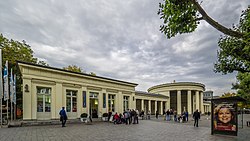
-
Elisa Fountain
address: Friedrich-Wilhelm-PlatzBuilt 1827, thermal waters of the spa town.
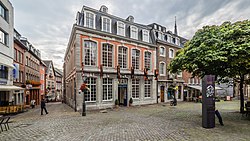
-
phone: +49 241 4324 421address: Hühnermarkt 1718th-century house and furniture.
-
Belvedere rotating water tower
phone: +49 241 9188 043address: Belvedereallee 5Park above the town. -
Grashaus
address: FischmarktOriginal town hall, completed in 1267, is one of the oldest buildings in Aachen.
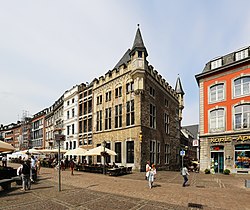
Haus Löwenstein14th-century building.
-
phone: +49 241 4798address: Wilhelmstraße 18German and Dutch sculpture and painting collection.
Ponttor14th-century city gates.
Marschiertor13th-century city gate.
-
phone: +49 241 9970 615address: Horbacher Straße 497, 52072 Aachen-HorbachMuseum about border crossings and the border.
- RWTH Aachen University (Rheinisch-Westfälische Technische Hochschule Aachen) If you are interested in architecture, you can find all building styles from 1900 till today concentrated at the city-campus around Templergraben.
- Main building
- Kármán Auditorium
- Audimax
- Mogam
- Super-C The reception building of the RWTH-Aachen. Build to resemble the letter C. Nicely illuminated at night.
- Reiff Museum
- Rogowski building
- Department of mining
- Semi 90
- Heizkraftwerk (now lecture halls)
UniklinikThe university's hospital. One striking example of post-modern architecture like the Centre Pompidou in Paris.
Do
LousbergA recreational area situated just north of the city centre that offers stunning views of the city below.
- Sit on the Market place (central city) on a summer evening, watch students strolling by, listen to guitar players and have a beer, bought at a small Turkish or Chinese diner around.
- Walk through the Frankenberger Viertel (Frankenberg Quarter), an alternative area in the south of Aachen; have lunch or dinner in a Turkish or Arab diner.
-
address: Passstr. 79Large and very well known spa, sauna and wellness place.
Learn
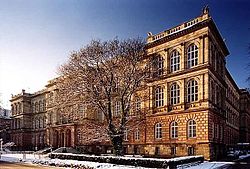
Aachen is home to the highly regarded RWTH Aachen University, which is particularly strong in the field of mechanical engineering. While language courses during semester time are only available to students of the university, travellers may be interesting in applying for the Internationaler Sommerkurs (international summer course) which takes place annually in September and is open to students from some partner universities. Alongside an intensive language course, participants can take advantage of the programme of cultural events offered. To apply, one must be at least 18 years old and have prior knowledge of German at level A1 (the lowest level, roughly equivalent of being able to write a post card) on the Common European Framework for Languages or above.

Buy
-
phone: +49 241 2514 1From late November until 23 December, Aachen's Christmas market takes over Katschhof, Münsterplatz and the market square. Traders offer a wide variety of gift ideas, such as cosmetics, jewellery and ceramics, and there are plenty of opportunities to eat and drink your fill - a trip here wouldn't be complete without a glass of Glühwein! If you need a break, take in a performance at the rear of the town hall (see the website for a detailed programme). The market looks particularly spectacular when lit up at night, set against the magnificent cathedral and town hall.
AdalbertstraßeShops and cafes in one of Aachen's pedestrian zone shopping areas.
Krämerstraße and MarketSmall shops in a very touristic area.
GroßkölnstraßeThe second big pedestrian zone shopping area in Aachen, where you´ll find clothing and more.
JakobstraßeSmaller shops and boutiques.
-
address: Süsterfeldstraße 130, 52072Stocks a wide range of Lindt chocolate products, at low prices, which have been produced in the neighbouring factory.
-
address: Ritterstraße 9Gingerbread and biscuits.

-
address: Münsterplatz 3
-
address: Krämerstraße 12
Eat
Budget
-
address: Pontstraße 119Very cheap and good chicken, pizza and Turkish food.
-
address: Marienbongard 24Polish bistro. Has lunch offers. Four to six Polish beers.
-
Frietnesse
address: PontstraßeFries with over 50 different sauces. Also hamburgers and Dutch specialities. -
address: Pontstraße 118Turkish food besides döner kebab.
-
Jakobsimbiss
address: Jakobstraße 75Chinese and Thai fast food. -
address: Jakobstraße 73Best ice cream in town.
-
Sultans of Kebab
address: Peterstraße 23Döner Kebab, Turkish desserts. -
Babylon
address: Königstraße / Karlsgraben"The Kebab Cube" if you have only left. -
White House
address: Pontstr. 141- 149Cheap but still nice-looking restaurant with special lunch offers: Buffet for or Schnitzel for .
Mid-range
-
Goldener Schwan
phone: +49 241 3164 9address: Markt 3715th-century building where you can get local and German meals. For example Aachener Puttes a type of Blutwurst similar to English black pudding. -
phone: +49 241 2140 8address: Reihstraße 10Delicious Argentinian food chain based in Germany. Good food, not expensive. Open late and offer late-night specials and lunch specials.
-
phone: +49 241 238 00address: Seilgraben 39Great steakhouse with a salad bar and wide variety of dishes.
-
Carlos I
phone: +49 241 2966 6address: Rennbahn 1This Spanish restaurant offers authentic Spanish cuisine like Tapas, the perfect food for sharing, Paella, etc., at medium prices -
San Sheng
address: Pontdriesch 13Authentic Chinese food. -
phone: +49 241 9008 360address: Pontstraße 83Great Japanese restaurant. Reserve your table in advance.
-
phone: +49 241 4636 3642address: Pontstraße 23Italian pizza from a real stone oven.
-
phone: +49 1573 5570 933address: Sandkaulstraße 5Colombian restaurant.
-
phone: +49 241 3051 1address: Templergraben 28Greek restaurant frequented mostly by students.
-
phone: +49 241 155545address: Roermonder Str. 28Great Greek restaurant with a wide variety of dishes. Absolutely recommendable gyros and grill dishes
Splurge
-
phone: +49 241 7444 4address: Hanbrucher Straße 1French restaurant
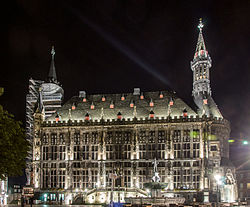
Drink
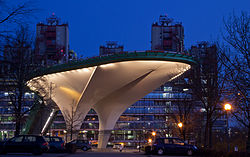
MolkereiPub suitable for younger crowd, near Ponttor.
Cafe MadridPub/bar better for an older crowd, posher, near Ponttor.
PontgartenCheap cocktails and nice food.
Sowiso/OceansTypical student-inn.
-
phone: +49 241 4077 46address: Pontstraße 1–3A delightful bar/café that occasionally hosts live music. Food can be ordered from the Lebanese restaurant next door and brought to your table without you having to get up!
-
phone: +49 241 4022 11address: Neupforte 6, 52062A stereotypical Irish pub, just like you'd find in any other big city. However, it's one of the few places in Aachen that sells cider, so it's definitely worth checking out if beer isn't your thing! There's also live music (more often that not traditional Irish music) here on a regular basis.
-
Kiste
address: Büchel 36Small pub with wooden interior that plays mostly rock and metal music. Has a discount on different drinks each day, e.g. Weizen (wheat beer) on Mondays for -
Buddha Bar
phone: +49 241 4012 590address: Büchel 14Nice food, has a non-smoking area upstairs with restaurant and bar plus a cool smoking area downstairs with an impressive Buddha statue.
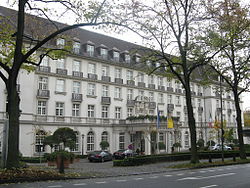
Sleep
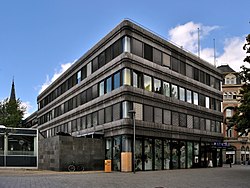
Budget
-
phone: +49 241 4305 288address: Mauerstraße 116Close to the city centre.
-
phone: +49 241 7110 10address: Maria Theresia Allee 260
Mid-range
-
phone: +49 241 1803 0address: Krefelder Straße 221
-
phone: +49 241 1520 71address: Passstraße 2aThis friendly family-run place has 12 rooms and a bit of a cosy B&B atmosphere. It's clean and conveniently located in the city centre, with fairly modern rooms and a somewhat quaint breakfast area. It gets good reviews, also suited for family stays. On weekends, the reception has limited opening hours.
Splurge
-
phone: +49 241 9132 0address: Monheimsallee 52Spacious, comfortable rooms (although some could do with a little redecoration), a swimming pool, fitness area and excellent breakfast buffet.
Connect
-
Post Office
address: Kapuzinergraben 19, 52062This is probably the most convenient Post Office for tourists as it's located in the city centre. The service is operated by Deutsche Post.
Cope
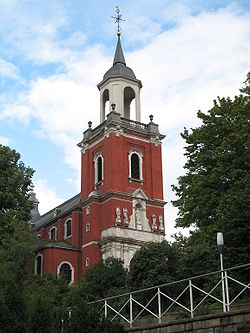
Catholic churches:
-
phone: +49 241 4770 9110address: Klosterplatz 2
-
phone: +49 241 4703 270address: Ursulinerstr. 1
-
phone: +49 241 3072 5address: Aureliusstraße 23
-
phone: +49 241 4488 1address: Peterskirchhof 1
-
St. Michael
address: Michaelsbergstr. 6
For Protestant churches in Aachen see also:
-
address: Annastraße 35
-
address: Am Kupferofen 19-21
Other:
-
Greek Orthodox Church St. Michael & St. Dimitrios
phone: +49 241 2857 2address: Jesuitenstr. 6 -
phone: +49 241 4778 00address: Synagogenplatz 23
-
phone: +49 241 8890 6address: Prof.-Pirlet-Str. 20
Go next
- Neupré - World War II Ardennes American Cemetery and Memorial, commemorates the American soldiers who died in Northern Europe during WWII
- Henri-Chapelle - World War II Henri-Chapelle American Cemetery and Memorial. The final resting place for 7,992 American military dead lost during the drive into Germany
- Dreiländereck- The three-country border of Germany, the Netherlands and Belgium. Just a 10 min drive out of Aachen in the general direction of Vaals (Netherlands). Walk on the soil of three different European countries in just about under a second. Free. This is also the highest point of the Netherlands. There is a watchtower you can climb. You can get there best if you take the bus to Vaals and take Veolia Transport line 149 or walk.
- Cologne - Germany's fourth largest city, with its striking cathedral, is less than an hour away by train.
- Zülpich is a small town dating from Roman times on the road to Bonn. It has a newly opened museum focusing on Roman baths and bathing culture. It is also a gateway to the Eifel region.
- Maastricht in the Netherlands with its beautiful city centre is where the Maastricht Treaty of the European Union was signed in 1992
- Monschau Nicely preserved medieval town.
- Nationalpark Eifel The youngest nature preservation area in Germany
- Ordensburg Vogelsang Huge Nazi-built training centre near Gemünd. Served as Belgian barracks after the war, so they're quite well preserved.
- Hohes Venn Marshlands between Monschau and Eupen
